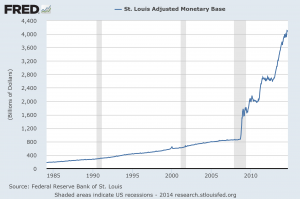Janet Yellen has been handling the job of chairing the Federal Reserve quite well. We know because, like Alan Greenspan, no one knows what she means when she is being questioned in Congress or at a press conference. Yes, Dr. Yellen speaks another language called “Fedspeak.” Bloomberg ran an article that originally had the phrase “Ambidextrous Yellen” in the title, which has since been changed. It referred to Harry Truman's desire to work with a “one handed” economist who could give you a straight unequivocal answer. The main topic of the article is the array of statistical indicators that she is looking at to guide Fed policy. A business acquaintance warned me about using too much data by reciting an old saying: “A man with two watches is never quite certain what time it really is.” That is, it's almost impossible to get watches in perfect sync, and if one winds down or the battery dies, or if one if faster or slower than the other, you are left with guesses as to the actual time. Then you have to go to a third resource. Nowadays we have access to clocks over the Internet or other sources, but back in the dark ages (before 1995), we might actually have to ask another person with a watch! The more data collected, the more confusing it would be as to the correct time.
The more data one has the more indecisive one can become. Executives are paid to make long term decisions based on informed experiences. Different data series are often contradictory, and by the time all or the majority of indicators move in one harmonious direction, whatever trend was of interest has probably passed already. Some executives look at economic data in the way stock market or commodity traders do, but they shouldn't because the executive's time horizon and the trader's time horizon are so very different.
As far as the Fed is concerned, the new “openness” started by Ben Bernanke probably does more harm than good. Journalists love it. When the Fed was more closed, the semi-annual Humphrey-Hawkins testimony before Congress offered some insight into their thinking. Now there seems to be a press conference about everything. In the past, there would be great speculation about Fed action, and the fear of bad guessing gave the market some fear of error that kept things in line. Now there are two bets the markets make: what will they say and will they act that way. Now the markets move on what the Fed says, not what it actually does. The arbitrageurs in the market love it. They may be the only ones.
This creates an environment that encourages one of the worst habits that managers can fall into, acting on the last thing they hear. There are times when that is appropriate (a fire alarm) but others when it is not. The habit makes long-term planning impossible.
During the times of Greenspan's forecasts at Humphrey-Hawkins testimony, his forecasts were correct 1 in 12 times. Should we really pay attention to what the Fed does? Probably not.
We know that technological and social trends are far more important in shaping our industry's future than anything that the Fed does. Did Alan Greenspan saying “Modest pre-emptive actions can obviate the need of more drastic actions at a later date, and that could destabilize the economy” help anyone? The fact that the Dr. Yellen now says those kinds of things at a press conference does not change much in terms of the short-, mid-, and long-term decisions that businesspeople grapple with every day. Focus on what your clients will do next, not the Fed.
* * *
The Fed's ending of quantitative easing and all it means is that they are no longer buying debt instruments, but they will still have a huge balance sheet. So here it is and the Fed's balance sheet is going along averaging 6% per year growth for decades, and then BOOM!, the financial crisis comes along and they start buying debt. They decide it wasn't enough, so they buy more. That wasn't enough either, so they bought more.

We thought that getting to $2.8 trillion was scary. Then they went to $4 trillion. Those days are now over, so what happens next?
It seems the Fed doesn't know either, so the most conservative route is to just let all of these bonds and financial instruments mature and not replace them.
Unless there is another financial disruption, the Fed is done, and it's more likely they would lightly tighten according to an announced schedule.
The Fed actions did little. They may have led to a calming of the markets but they did not stimulate economic growth. They have admitted that they're done and they have no other tools to apply to the problem. The money sat in the banks and made their balance sheets look better, but the money lending to expand economic activity never really happened in the way it was planned. More time passed, and the banks slowly improved on their own, so stopping QE is not that big an action any more.
* * *
Former Fed chair Paul Volcker, 87, possibly the best Fed chair in history, was recently interviewed. He's suggesting that going back to a system where the dollar is pegged to gold in the way it was after WW2 before President Nixon let the dollar float. Volcker believes the gold link instilled discipline in the monetary system. There are many types of gold standards, this is one of them. I don't know if they need it, since going back to a "rules based" system would work. Greenspan followed the path of bond rates and his actions (prior to the actions related to Y2K) actually followed a long-term average price of gold. Volcker is still influential and his reputation grows over time.
# # #














